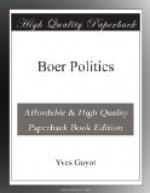The argument against England’s suzerainty over the Transvaal is well known; the preamble to the 1881 Convention, in which the word occurs was not reproduced in the Convention of 1884.
But it is also known, that, in the letter to Lord Derby of November 14th, 1883, the delegates from the Pretoria Government demanded restrictions of “the right of suzerainty reserved to Her Majesty by Articles 2 and 18 of the Convention of 1881,” and claimed, that “the relation of dependence publici juris in which their country now finds itself placed with regard to the British Crown shall be replaced by that of two contracting parties.” In his despatch of November 29th, Lord Derby replied, that their “pretension to enter into treaty as between two contracting powers was neither in form nor substance acceptable by Her Majesty’s Government.”
The Preamble of the Convention of 1884 speaks of the representations of the delegates of the Pretoria Government, “which Her Majesty has been pleased to take into consideration.”
Not daring to efface with a stroke of his pen the suzerainty question, Dr. Kuyper attempts a metaphorical distinction:—
“The suzerainty
question solves itself. Suzerainty may be an
“organic or mechanical
relation”; if mechanical, it is arranged by
contract.”
When Dr. Kuyper declares England’s suzerainty to be of the mechanical order, he admits that the Transvaal did not hold towards England the position of an absolutely independent State.
Having been obliged to recognise the right of veto, which Article 4 confers upon England regarding the external relations of the Transvaal, he contradicts himself when he invokes the principle of the equality “of States among themselves.”
Taking refuge in a kind of prescription, he says: “Never, before 1898, had England breathed a word regarding suzerainty throughout all her interminable correspondence.”
On March 6th, 1897, however, Mr. Chamberlain addressed a despatch to the South African Republic, in which he complains of several failures to observe the Convention of 1884. The following facts are cited by him: (1) Conclusion of a treaty of extradition with Holland, signed at the Hague, November 14th, 1895; of an act with Portugal, signed at Lisbon, November 3rd, 1893; of a convention with Switzerland, signed September 30th, 1896—none of these treaties had been submitted to the English Government, in violation of Article 4 of the Convention of 1884; (2) Laws concerning the emigration of foreigners, the expulsion of foreigners, the Press, all in contravention of Article 14 of the 1884 Convention.
Mr. Van Boeschoten, Secretary of State to the Transvaal at that time, proposed arbitration, the arbitrator to be chosen by the President of the Swiss Confederation.
Replying on October 16th, 1897, Mr. Chamberlain said that in making this proposal the Pretoria Government “appears to have misunderstood the distinction existing between two independent powers.”




